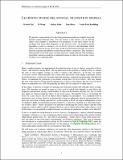Notice
This is not the latest version of this item. The latest version can be found at:https://dspace.mit.edu/handle/1721.1/132315.2
Learning sparse relational transition models
Author(s)
Xia, V; Wang, Z; Allen, K; Silver, T; Kaelbling, LP
DownloadAccepted version (3.945Mb)
Open Access Policy
Open Access Policy
Creative Commons Attribution-Noncommercial-Share Alike
Terms of use
Metadata
Show full item recordAbstract
© 7th International Conference on Learning Representations, ICLR 2019. All Rights Reserved. We present a representation for describing transition models in complex uncertain domains using relational rules. For any action, a rule selects a set of relevant objects and computes a distribution over properties of just those objects in the resulting state given their properties in the previous state. An iterative greedy algorithm is used to construct a set of deictic references that determine which objects are relevant in any given state. Feed-forward neural networks are used to learn the transition distribution on the relevant objects' properties. This strategy is demonstrated to be both more versatile and more sample efficient than learning a monolithic transition model in a simulated domain in which a robot pushes stacks of objects on a cluttered table.
Journal
7th International Conference on Learning Representations, ICLR 2019